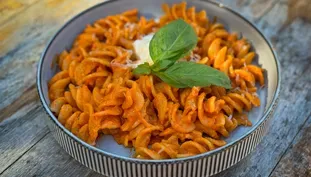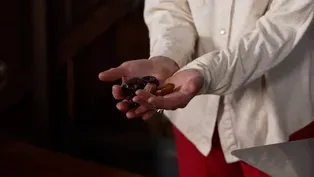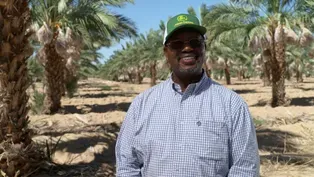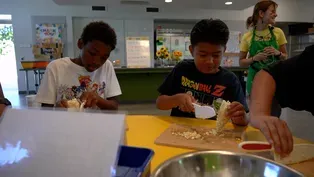
Manseena Orchards
Clip: 8/2/2024 | 5m 52sVideo has Closed Captions
A family originally from India pass their prune orchard onto their daughters in Northern California.
Meet the two sisters behind this prune orchard, who work with their parents every day -- and say they wouldn’t have it any other way.
Problems with Closed Captions? Closed Captioning Feedback
Problems with Closed Captions? Closed Captioning Feedback
America's Heartland is presented by your local public television station.
Funding for America’s Heartland is provided by US Soy, Sustainable Agriculture Research and Education, Rural Development Partners, and a Specialty Crop Grant from the California Department of Food and Agriculture.

Manseena Orchards
Clip: 8/2/2024 | 5m 52sVideo has Closed Captions
Meet the two sisters behind this prune orchard, who work with their parents every day -- and say they wouldn’t have it any other way.
Problems with Closed Captions? Closed Captioning Feedback
How to Watch America's Heartland
America's Heartland is available to stream on pbs.org and the free PBS App, available on iPhone, Apple TV, Android TV, Android smartphones, Amazon Fire TV, Amazon Fire Tablet, Roku, Samsung Smart TV, and Vizio.
Providing Support for PBS.org
Learn Moreabout PBS online sponsorshipNarr: In the shadow of the Sutter Buttes in the Sacramento Valley, Yuba City is home to rich farmland known for its peaches, prunes and nuts.
It's also home to the largest rural Punjabi community outside the Indian subcontinent.
Here, ties are forged across continents and across generations.
Sureena: But the fruit looks good.
The size looks amazing.
Look at this.
Let's look at the fruit size.
Ooo.
Yeah, Joginder: Thats where the money is.
Sureena: And that's where the money is.
Narr: Joginder Bains immigrated to Yuba City from India more than 70 years ago, followed by his wife, Kulwant.
He worked as a laborer and she is a teacher while saving up money for land.
Land which their daughters, Sureena and Manpreet now farm together after returning to their hometown as adults.
Sureena: When you're younger, you take off and you kind of want to go do your thing and you want to have that freedom, and then later in life, you want to support.
I decided to come back because I wanted to be a part of a business with my parents.
I wanted to spend time with them.
I wanted to be here with them.
My dad still drives around the ranch and tells me “Ten rows in and six rows over that tree is dying.
Like I don't know what you did, but you should go check it out.” They're very much still involved, and I think that's why they're still here at 85 and 90.
Joginder: In farming, weather never is good.
Sureena: I know!
It's always the unpredictable variable.
Narr: Sureena manages the orchard while her sister, Manpreet, oversees the financials.
Their farm, Manseena Orchards, is a combination of their first names.
They grow prunes and walnuts and partner with other local farmers on almonds.
Manpreet: We all want to be stewards of the land.
This is why we own what we own.
And we came back to do what we... we do.
I think it's something that we need to protect and grow and invest in and create space for the next generation.
Narr: Prunes, made from dried plums, are one of this region's top crops, typically harvested in late summer.
A mechanical shaker moves quickly through the rows at an impressive rate of five trees per minute.
The fruit rolls onto a receiver and is collected in bins.
Then they're transported to a drier where the fruit goes through a deep tank and on to trays.
Those trays are rolled into tunnels heated up to 185 degrees.
They'll emerge from the same tunnels about 24 hours later, cured and then shipped as part of the Sun Sweet Growers Cooperative.
Sureena's husband, Ravi Thiara, operates the drying facility.
That processes her fruit.
It's located on his family's farm called Thiara Orchards.
Like the Bains, the Thiaras are originally from India and collectively share a passion for farming and continuing a tradition from their homeland.
Sureena: My dad came here in 1953, and like many Punjabi farmers that are here today, they come from an area called Punjab, and it is an area surrounded by five rivers, which is what Punjab means.
They farm there because of the soil being very rich.
So when the Punjabis move here to the United States, they tend to then go right back into farming because that's what they do back home.
Narr: Immigration rapidly grew after the 1960s, and about 18,000 Punjabi residents live in the greater Yuba City area today, and the city draws five times as many people to its annual Sikh parade.
One of the largest events outside India.
Narr: They really built a homeland here based on the homeland that they left behind.
So with temples and gurdwaras and food places and all of that, it just became more and more of the cultural fabric of of Yuba City and the wider Sutter County area The sisters say that Punjabi women play a big role in fostering this tight knit community.
While women only make up about 37% of the farmers and ranchers in California, that number is growing.
And the sisters say it gives them hope that they can be role models to the next generation.
It's a trait they learned from their own mother.
Sureena:My dad always said she's the brains behind our business.
The... the kind of manifester of things.
And my dad would put it into action.
Manpreet: He's the dreamer of sorts, but it's because it's due to my mom's credit.
And everyone will say that... that... that they have what they have today.
Narr: As American farmers grow older, the question of what will happen to their land and their legacy is often uncertain.
But here in this fertile land cared for by generations, the Bains family knows that whatever comes next, they'll be doing it together.
Manpreet: Being with them at 90 years old and 85 years old, I'll never get that time again.
So watching them, um, just slowly, graciously hand everything over to my sister and I, and then being there for them as they get older has been a gift that I didn't anticipate or expect.
So that's been probably one of the most positive parts of coming back to the farm.
Sureena: And it's super... it's just super important that I keep learning from them.
My sister keeps learning from them.
My kids are learning from them and the story goes on.
The California prune industry owes its success today to a Frenchman named Louis Puglia, the son of two winemakers.
He arrived in San Francisco during the gold rush but didn't strike it rich.
Instead, he started a plant nursery in San Jose.
He sent his brother back to France to retrieve cuttings of the dish on plum tree, which were transported in trunks by ship back to San Francisco.
The cuttings were grafted onto a wild plum tree and flourished.
Today, California produces 99% of the nation's prune crop and 70% of the world's prunes.
Bell Pepper Pasta – Farm to Fork with Sharon Profis
Video has Closed Captions
Clip: 8/2/2024 | 5m 24s | Learn how to cook a spicy roasted red bell pepper pasta. (5m 24s)
Video has Closed Captions
Clip: 8/2/2024 | 2m 36s | Our nutrition expert looks at the sugar content of dates, and why they are a sweet treat. (2m 36s)
Video has Closed Captions
Clip: 8/2/2024 | 4m 54s | Meet a farmer growing dates he calls “Black Gold.” (4m 54s)
Video has Closed Captions
Clip: 8/2/2024 | 4m 37s | Visit a cooking school and farm for elementary school students. (4m 37s)
Providing Support for PBS.org
Learn Moreabout PBS online sponsorshipSupport for PBS provided by:
America's Heartland is presented by your local public television station.
Funding for America’s Heartland is provided by US Soy, Sustainable Agriculture Research and Education, Rural Development Partners, and a Specialty Crop Grant from the California Department of Food and Agriculture.















